Comprehensive Guide to Garden Maintenance in Battersea
Introduction to Garden Maintenance
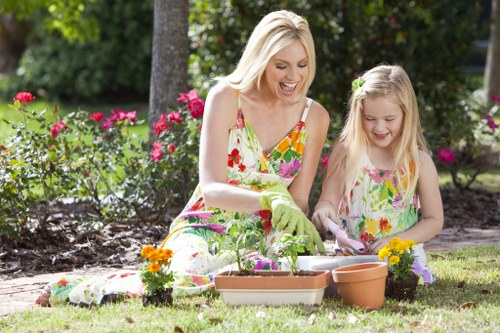
Maintaining a beautiful garden in Battersea requires dedication, knowledge, and the right resources. Whether you're a seasoned gardener or a beginner, understanding the unique climate and soil conditions of Battersea can help you cultivate a thriving outdoor space.
Garden maintenance involves a variety of tasks, from planting and pruning to pest control and seasonal clean-ups. By keeping up with these responsibilities, you can ensure your garden remains healthy and aesthetically pleasing throughout the year.
In Battersea, the temperate climate presents both opportunities and challenges for garden enthusiasts. With mild winters and warm summers, gardeners can enjoy a diverse range of plants and flowers. However, it's essential to adapt your maintenance practices to accommodate the local weather patterns and soil types.
Seasonal Garden Care
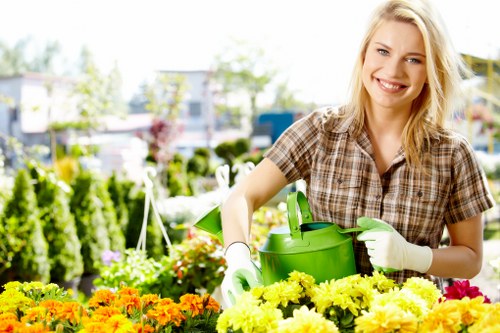
One of the key aspects of garden maintenance is adjusting your care routines according to the seasons. Each season brings its own set of tasks that are crucial for the health and growth of your plants.
Spring: This is the time to prepare your garden for the growing season. Start by clearing away any debris from winter, pruning dead branches, and planting new seeds or seedlings. Fertilizing your plants can also give them the boost they need to thrive.
Summer: During the warmer months, regular watering becomes vital. Ensure your garden receives adequate moisture, especially during dry spells. Additionally, keep an eye out for pests and diseases, addressing any issues promptly to prevent them from spreading.
Soil Preparation and Improvement
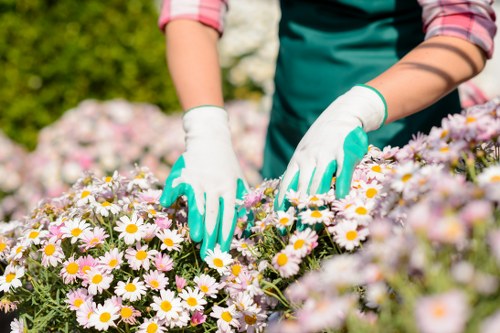
Healthy soil is the foundation of a successful garden. In Battersea, soil quality can vary, so it's essential to test and amend it as needed. Adding organic matter like compost can improve soil structure, drainage, and fertility.
Consider incorporating natural fertilizers and mulch to retain moisture and suppress weeds. Regularly turning the soil and removing any weeds or unwanted plants can also promote better growth conditions for your desired plants.
Understanding the pH levels of your soil can help you select the right plants that will thrive in your garden. Most plants prefer slightly acidic to neutral soil, but some may require specific pH ranges.
Pruning and Trimming Techniques
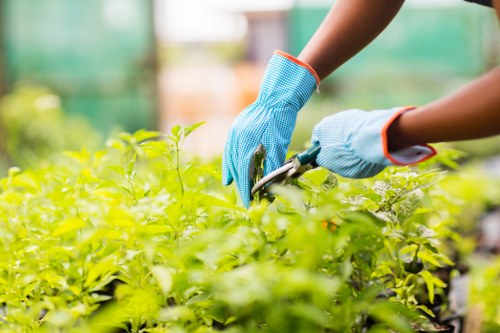
Pruning is a critical maintenance task that helps shape your plants, promote healthy growth, and remove any diseased or damaged parts. In Battersea, timely pruning can prevent unwanted growth and maintain the aesthetic appeal of your garden.
Different plants require different pruning techniques. For example, flowering shrubs may need to be pruned after blooming to encourage new growth, while fruit trees benefit from annual pruning to enhance yield and prevent overcrowding.
Using the right tools and techniques is essential for effective pruning. Ensure your tools are clean and sharp to make precise cuts that minimize stress on the plants.
Pest and Disease Management
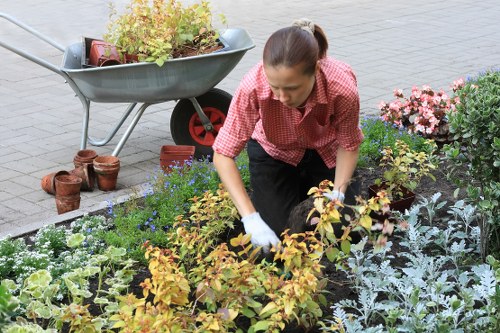
Pests and diseases can significantly impact the health of your garden. In Battersea, common garden pests include aphids, slugs, and caterpillars, each posing different threats to your plants.
Implementing an integrated pest management (IPM) approach can help control these issues sustainably. This involves monitoring pest populations, encouraging natural predators, and using organic or chemical treatments when necessary.
Regular inspection of your plants can help you detect early signs of pest infestations or diseases. Prompt action can prevent minor issues from escalating into major problems.
Weed Control Strategies
Weeds compete with your garden plants for nutrients, water, and light, making effective weed control essential. Regularly removing weeds by hand or using appropriate tools can help keep your garden tidy and prevent weed seeds from spreading.
Applying mulch is an excellent way to suppress weed growth while also conserving soil moisture and enhancing soil quality. Organic mulches, such as straw or wood chips, can break down over time, enriching the soil.
Herbicides can be used for more persistent weed problems, but it's important to choose the right type and apply it carefully to avoid damaging your desirable plants.
Watering Techniques for a Thriving Garden
Proper watering is crucial for maintaining a healthy garden in Battersea. Overwatering can lead to root rot and other issues, while under-watering can stress plants and inhibit growth.
Implementing efficient watering systems, such as drip irrigation or soaker hoses, can help deliver water directly to the plant roots, reducing waste and ensuring consistent moisture levels.
It's also beneficial to water your garden early in the morning or late in the evening to minimize evaporation and allow plants to absorb water effectively.
Lawn Care and Maintenance
A well-maintained lawn can enhance the overall appearance of your Battersea garden. Regular mowing, aeration, and fertilization are key components of effective lawn care.
Mow your lawn to the appropriate height for your grass type, ensuring you don't remove more than one-third of the grass blade at a time. This promotes healthy growth and prevents stress.
Aerating your lawn annually can improve soil structure, enhance root growth, and increase nutrient absorption. Additionally, applying the right fertilizer can provide your grass with the necessary nutrients to stay lush and green.
Plant Selection for Battersea Gardens
Choosing the right plants is essential for creating a resilient and beautiful garden in Battersea. Consider the local climate, soil conditions, and sunlight availability when selecting plants.
Opt for native plants that are well-adapted to the area's environment, as they typically require less maintenance and are more resistant to local pests and diseases.
Incorporating a mix of perennials, annuals, shrubs, and trees can add diversity and ensure your garden remains vibrant throughout the year.
Using Sustainable Practices in Garden Maintenance
Sustainable garden maintenance practices not only benefit the environment but also promote a healthier garden. Implementing techniques like composting, rainwater harvesting, and using organic fertilizers can make your garden more eco-friendly.
Composting kitchen scraps and garden waste creates rich humus that improves soil fertility. Rainwater harvesting systems can provide a sustainable water source, reducing reliance on tap water.
Choosing organic fertilizers and pest control methods minimizes the use of harmful chemicals, fostering a safe and healthy environment for both your plants and local wildlife.
Hardscaping and Garden Structures
Incorporating hardscaping elements like pathways, patios, and garden structures can enhance both the functionality and aesthetics of your Battersea garden.
Well-designed pathways guide visitors through your garden, while patios provide spaces for relaxation and outdoor gatherings. Garden structures such as pergolas, arbors, and raised beds add visual interest and can support climbing plants.
Choosing durable and weather-resistant materials ensures that your hardscaping features withstand the elements and require minimal maintenance over time.
Lighting and Irrigation Solutions
Proper lighting can transform your garden into a magical space during the evenings. Use a combination of ambient, task, and accent lighting to highlight key features and create a welcoming atmosphere.
Solar-powered lights are an eco-friendly option that reduces energy consumption. Additionally, automated irrigation systems can streamline your watering routine, ensuring your plants receive consistent moisture without manual intervention.
Integrating smart technology into your irrigation systems allows for precise control and monitoring, optimizing water usage based on weather conditions and plant needs.
Maintaining Garden Tools and Equipment
Keeping your garden tools and equipment in good condition is essential for efficient maintenance. Regular cleaning, sharpening, and proper storage extend the lifespan of your tools and ensure they perform optimally.
Inspect your tools for any signs of wear or damage before each use. Repair or replace parts as needed to maintain their functionality and safety.
Storing tools in a dry, sheltered area prevents rust and other forms of deterioration, keeping them ready for your next gardening session.
Enhancing Garden Biodiversity
A diverse garden supports a variety of plants, insects, and wildlife, creating a balanced ecosystem. Planting a range of species attracts beneficial insects like bees and ladybugs, which help control pests naturally.
Incorporating features like birdhouses, insect hotels, and water sources can further enhance biodiversity, providing habitats for different creatures and promoting a healthy garden environment.
Understanding the relationships between different plants and wildlife can help you design a garden that thrives naturally, reducing the need for artificial interventions.
Dealing with Common Garden Challenges
Every garden faces its own set of challenges, whether it's dealing with adverse weather, pests, or plant diseases. Being prepared and proactive can help you address these issues effectively.
Implementing preventive measures, such as proper plant spacing and choosing disease-resistant varieties, can minimize the impact of common garden problems.
When challenges arise, seeking advice from local gardening experts or joining community gardening groups in Battersea can provide valuable insights and support.
Creating a Sustainable Garden Plan
Developing a comprehensive garden maintenance plan ensures that all aspects of your garden receive the attention they need throughout the year.
Your plan should include a schedule for seasonal tasks, a list of necessary tools and supplies, and strategies for dealing with potential challenges. Regularly reviewing and updating your plan can help you stay organized and adapt to any changes in your garden's needs.
Incorporating sustainable practices into your garden plan not only benefits the environment but also promotes long-term garden health and resilience.
Conclusion
Effective garden maintenance in Battersea involves a combination of knowledge, planning, and consistent effort. By understanding the local climate, selecting the right plants, and implementing sustainable practices, you can create and maintain a vibrant and healthy garden.
Whether you're aiming for a serene retreat or a lively outdoor space, proper maintenance is key to achieving your gardening goals. Embrace the joys of gardening and watch your Battersea garden flourish.
Ready to transform your garden? Contact us today to book your garden maintenance service and enjoy a beautiful, thriving outdoor space all year round.